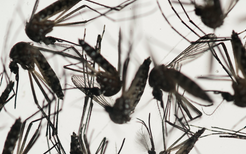WASHINGTON -- Puerto Rico is facing three converging crises demanding congressional attention: hundreds of cases of Zika, a $72 billion fiscal disaster and growing financial concerns about its Medicaid program.
As lawmakers consider a $1.1 billion package to combat the spread of the mosquito-borne Zika virus that causes birth defects, the territory's long-standing problems with funding its joint federal-state health insurance program for the poor are coming to a head.
Thomas Frieden, director of the Centers for Disease Control and Prevention, said last month that the territory's fiscal problems are affecting Medicaid and that the Zika outbreak is exacerbating the situation. At least 906 Puerto Ricans were infected with Zika as of last week, the CDC said.
Sara Rosenbaum, a health policy professor with the George Washington University Milken Institute School of Public Health, said in an interview that Puerto Rico's issue with fighting Zika comes down to not having the capacity to provide prevention care and long-term contraceptives for women who haven't yet been exposed. The program also has difficulties providing care and counseling for women who already have the disease.
Federal funding for Medicaid in Puerto Rico, unlike the rest of the United States, is capped.
"This is like everyone's worst nightmare about Medicaid in that it is a block grant," Rosenbaum said. "The level of underfinancing is incredibly severe and the money just remains frozen year after year."
Rosenbaum said the island got an increase under the 2010 health care law, "but it's nothing like what's needed given the poverty of the population."
The health care law provided Puerto Rico an additional $6.4 billion in Medicaid funding until October 2019 and increased its federal match from 50 percent of funds to 55 percent. But less than half of that money is left and could be depleted as soon as mid-2017, according to the Centers for Medicare and Medicaid Services. For months, the Obama administration has urged that any measure that restructures Puerto Rico's debt also deal with the Medicaid issue, but a bill set up for a House floor vote later this month provides no help on that front.
Nearly half of Puerto Ricans receive health coverage through Medicaid, a much higher percentage than in the continental United States, in part because poverty and unemployment on the island is pervasive.
Resident Commissioner Pedro Pierluisi, the nonvoting representative of Puerto Rico in Congress, introduced a Medicaid bill last June. The bill would get rid of current funding limits and broaden the territory's Medicaid program to cover beneficiaries up to 100 percent of the federal poverty level with the federal government providing enhanced matching funds.
About 600,000 Puerto Ricans could lose coverage if federal funds decline, said Health and Human Services Secretary Sylvia Mathews Burwell earlier this year.
"A true solution for the 3.5 million Americans living in Puerto Rico, including reforms to strengthen Puerto Rico's Medicaid program, such as raising the federal share of Medicaid funding, requires Congress to act," she said.
A House Democratic aide familiar with the issue said in an interview that the expiration of the additional funding under the federal health care law could cause a "humanitarian catastrophe" if thousands of Puerto Rico residents who need care are dropped from the program.
A Section on 06/04/2016
